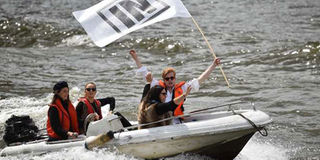Fishermen may get caught in Brexit net

A boat carrying supporters for the 'Remain' in the EU campaign shout and wave at Brexit fishing boats as they sail up the river Thames in central London on June 15, 2016. France’s national fishermen’s association has already warned the government that Brexit could “very strongly impact” the Brittany, Normandy and northern regions. PHOTO | AFP
What you need to know:
- But according to catch, the big boats play a big role. At Cherbourg, big trawlers account for two-thirds of the fish landed.
- Worries are acute in ports where large trawlers dock, particularly in Boulogne-Sur-Mer, France’s top fishing port.
CHERBOURG, France
While Britain’s exit is expected to have a limited overall impact on the European Union, offshore fishermen based in northern France face the grim prospect of losing access to their best waters.
If the yet to be negotiated Brexit terms mean French fishermen must stay out of British waters “one might as well sell the ship”, said Xavier Perrotte, the second in command of the Remember, a 23-metre (75-foot) trawler.
The Remember, with its eight-man crew, sails the roughly 100 kilometres (60 miles) from its home port of Cherbourg in Normandy to waters off the English coast where it pulls in half of its catch.
France’s national fishermen’s association has already warned the government that Brexit could “very strongly impact” the Brittany, Normandy and northern regions.
Not all fishermen will be impacted, however. Ships less than 12 metres rarely leave French territorial waters, except in the narrowest parts of the Channel, and they make up 80 per cent of the national fleet, according to official data.
But according to catch, the big boats play a big role. At Cherbourg, big trawlers account for two-thirds of the fish landed.
Worries are acute in ports where large trawlers dock, particularly in Boulogne-Sur-Mer, France’s top fishing port.
“If tomorrow we lose our historical access to British waters, that will sound the end of French fishing in Boulogne — the impact will be enormous,” said Bruno Margolle, head of the CME regional fishing cooperative.
In the neighbouring Calais region, where the Channel narrows to as close as 28 kilometres, they are “very worried”, said Olivier Lepretre, president of the local fishing council.
“If the British close their waters, we will lose important fishing grounds that account for 70 per cent of our catch,” he said.
Even where the Channel is wider, French trawlers could lose a lot: currently they can sail as close as six nautical miles (11 kilometres) to the British coast, while British ships can’t fish closer than 22 kilometres to the French coast.
Mr Sebastien Sagot, owner of a 24-metre trawler based at Treport, worries about a “big drop in revenues” if he can no longer fish in British waters.





